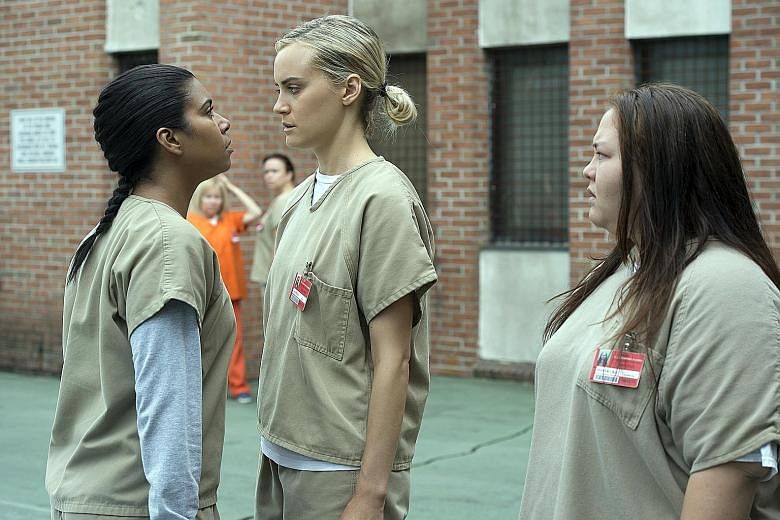LOS ANGELES • A hacker who tried to hold Netflix for ransom has achieved an unexpected result.
His failure shows that subscription-based business models in content distribution is making piracy pointless.
Someone called TheDarkOverlord stole most of the new season of Netflix's popular series Orange Is The New Black from a post-production studio and demanded ransom.
Netflix refused to pay and the hacker put the stolen material on the Pirate Bay for people to download via file-to-file sharing.
Netflix is unlikely to regret its decision to hold on to its money.
It is safe to say that its bottom line will not be affected - the most that might happen is that the fifth season of Orange will be released earlier than planned.
The reason for that can be found in networking solutions provider Sandvine's Global Internet Phenomena Report.
Last year, BitTorrent traffic reached 1.73 per cent of peak period downstream traffic in North America. That is down from the 60 per cent share that peer-to-peer file sharing had in 2003.
Netflix was responsible for 35.15 per cent of downstream traffic.
File sharing is the only traffic component of Internet traffic that is not growing - and is not projected to grow - in absolute terms, according to Cisco Systems.
Netflix's content has been pirated since it began producing its own shows, but that has never left a mark.
The company has the resources for legal fights when they are called for, but really, who wants to go through the trouble of using torrents - and risk problems with one's Internet provider or, especially in Europe, with the law - to see shows a little earlier?
Certainly, no one will cancel his Netflix subscription because one series is suddenly available for free download with an increasingly unpopular, inconvenient technology that does not allow for instant streaming.
People would consider that only if all the content available on Netflix could suddenly be streamed free of charge.
"Subscription" is the key word here. This business model is a piracy killer.
Another example: For 15 years, Adobe Systems tried to sell its image manipulation software for thousands of dollars a box to professional photographers and designers. Now that the software is sold as a service, for a monthly subscription fee, many are happy to pay.
Still, for companies in the content industry, the transition has not been entirely smooth.
Record companies, for example, lost massive amounts of money in the shift to streaming, not least because the music streaming industry pioneers initially gave a lot of music away for free, hoping to build advertising-based business models.
Now that this illusion is gone, streaming revenue is quickly growing and music catalogue owners and artists are more willing to cooperate with streaming services.
That means more bands and more songs on the likes of Spotify and Apple Music - and less music piracy. According to Muso, the digital content protection firm, there was a 6 per cent decline in visits to music piracy sites last year.
When it comes to video piracy, sites that illegally stream copyrighted content are the channel that beats torrents and other downloads today. Muso reported 77.7 billion visits to such sites last year.
Though it is far more convenient than torrents, video piracy is also slowly declining.
Subscription services such as Netflix are driving it down by expanding user choice and producing their own content, such as Orange Is The New Black.
There will always be people who consume pirated content because they are averse to paying even a small access fee.
Mostly, however, consumers are motivated by convenience.
Subscription services do not cost much and are easy and safe to use.
Finding decent quality videos on piracy sites without watching invasive advertisements and running the risk of malware infection is a hopeless enterprise.
Still, when it comes to video, copyright owners are less willing to release new and in-demand content to subscription services such as Netflix.
They are eager to preserve their theatre revenues during a movie's first run
Film studios are missing an opportunity there. According to Muso, there were 5.6 times as many visits to film piracy sites than to music piracy ones last year.
But, eventually, movie studios and streaming services should work out a reasonable, perhaps tiered, subscription price system to make more content available online.
It would drive down piracy, as the subscription model did in the software and music businesses, and it would make theft as nearly pointless as it has been in The DarkOverlord's case.
BLOOMBERG

